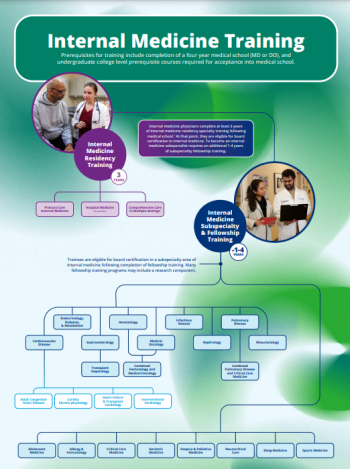Internal medicine physicians can choose to focus their practice on general internal medicine or take additional training to "subspecialize" in additional areas of internal medicine after completion of their core residency training.

training with this easy-to-follow infographic. Also
available in Spanish.
Subspecialties certified exclusively by the American Board of Internal Medicine:
- Cardiovascular Disease (heart and vascular system)
- Endocrinology, Diabetes, and Metabolism (diabetes and other glandular and metabolic disorders)
- Gastroenterology (gastrointestinal system, liver, and gall bladder)
- Hematology (blood)
- Infectious Disease (bacterial, viral, fungal, and parasitic infections)
- Nephrology (kidneys)
- Oncology (cancer)
- Pulmonary Disease (lungs and respiratory system)
- Rheumatology (joints and musculoskeletal system)
Subspecialties certified by the American Board of Internal Medicine in conjunction with other specialty boards:
- Adolescent Medicine (care of adolescents and young adults)
- Allergy and Immunology (immune system)
- Critical Care Medicine (care of patients in intensive care settings)
- Geriatric Medicine (care of older patients)
- Hospice and Palliative Medicine (care of patients with serious illness)
- Neurocritical Care (serious diseases of the nervous system)
- Sleep Medicine (sleep disturbances and disorders)
- Sports Medicine (sports and exercise)
The training an internal medicine physician receives to subspecialize in a particular medical area is both broad and deep. Subspecialty training (often called a "fellowship") usually requires an additional one to three years beyond the standard three year general internal medicine residency.
Additional Training Programs
Combined Training Programs
Residency programs that combine basic internal medicine with other disciplines are available that broaden the clinical skills of trainees and usually allow completion of training in a shorter period of time than performing different residencies independently. Internal medicine combined with pediatrics is the most common combined program, although residency programs combined with many other specialties are available.
Learn more about the unique leadership roles, career pathways and impact of internal medicine physicians. Learn more

